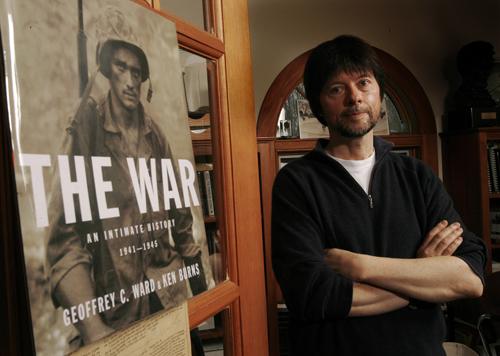Ken Burns adds half-hour to ‘The War’ series to include Hispanic, American Indian veterans

** FILE**Documentary filmmaker Ken Burns poses at his office in Walpole, N.H., in this April 5, 2007 file photo. Burns, criticized for overlooking the role of Hispanic soldiers in his new World War II documentary, said Wednesday that nearly a half-hour of Phil Collins
July 12, 2007
BEVERLY HILLS, Calif. – Ken Burns, criticized for overlooking the role of Hispanic soldiers in his new World War II documentary, said nearly a half-hour of footage on Hispanic and American Indian veterans is being added to the film.
Profiles of two Hispanics will conclude the first and sixth episodes of the roughly 15-hour, seven-part “The War,” debuting Sept. 23 on PBS, Burns told a news conference. An Indian soldier’s story will be at the end of episode five, he said.
“There’s been a hot political battle, and we tried to rise above and take the high road and respond as best we could,” Burns said.
“It doesn’t alter the vision of the film that we made and completed a year and a half ago,” he told a meeting of the Television Critics Association.
Altogether, about 28 minutes have been placed at the conclusion of the installments but before the credits, he said.
Get The Daily Illini in your inbox!
“We’ve done more than we were asked and expected to, which is our way of kind of honoring our own interest in doing this right,” he said.
Antonio Morales of the American GI Forum, a Hispanic veterans group, welcomed the inclusion of two Hispanic veterans.
“The two Latino Marines who are part of the documentary ‘The War’ represent the honor and patriotism of all Hispanic-Americans,” he said in a statement.
Burns initially resisted changes to the completed documentary. But in April, after protests by Hispanic groups, Burns brought aboard Hispanic documentarian Hector Galan, whose role was described as helping to fold in stories of Hispanic veterans during breaks in the series or at the end of episodes.
At the time, Hispanics said that response amounted to treating those veterans as an afterthought.
PBS has distributed the original version of the documentary to reporters but the revised version was still being polished, Burns said, and was not yet available.
Hispanic groups protested the documentary after Maggie Rivas-Rodriguez, a University of Texas at Austin journalism professor who has recorded oral histories of Hispanic veterans, learned they were not in Burns’ series.
In May, Burns met with representatives from the American GI Forum, a Hispanic veterans group, and the Hispanic Association on Corporate Responsibility.
The two groups and Rivas-Rodriguez did not immediately respond to requests for comment Wednesday.
Burns was asked if Hispanic groups would be satisfied by the changes.
“This is as far as we can go. We’re coming up to the broadcast,” Burns replied. “When you say these ‘Hispanic groups,’ there are a lot of different people with a lot of different agendas and a lot of different concerns.”
“We listened as hard as we could and tried to hear beyond the rhetoric and the politics of it,” he said.
As a filmmaker who has long sought to tell overlooked stories, it was “painful” to hear his documentary being misinterpreted, Burns said.
Burns’ film, made over six years, tells the story of World War II through people from four communities: Waterbury, Conn.; Mobile, Ala.; Sacramento, Calif.; and Luverne, Minn.
“The decision to make the changes to ‘The War’ was Ken’s, and I believe he made the right choice in adding the material,” PBS president and CEO Paula Kerger told reporters Wednesday. It represents the kind of responsiveness PBS owes to the public, she said.






